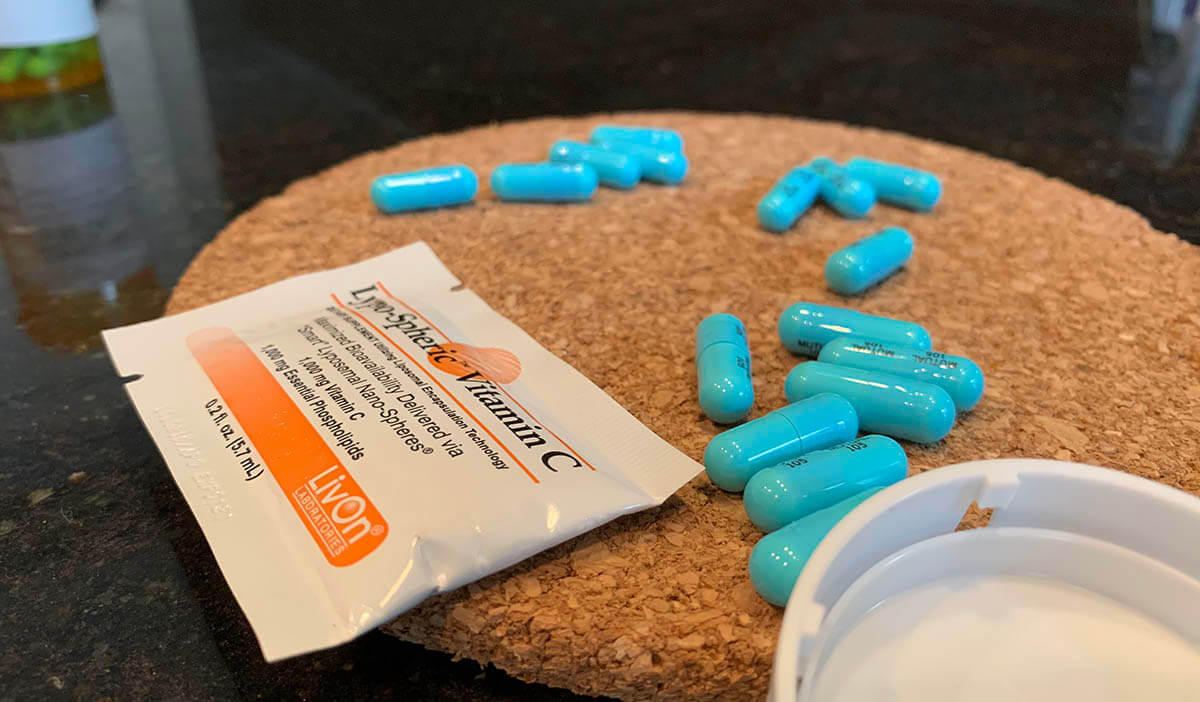
Aspirin1
While multiple studies over the past 50 years confirm that aspirin use lowers Vitamin C levels in white blood cells, researchers present multiple mechanisms at play. Whether it’s increased fecal excretion2, absorption interference, or drug-induced damage to the gastric lining3 diverting Vitamin C from other cell and tissues, the research shows that aspirin prevents critical immune system blood cells from absorbing optimal amounts of Vitamin C.Proton Pump Inhibitors
Types of PPIs known to deplete Vitamin C1
Esomeprazole, lansoprazole, omeprazole, pantoprazole, rabeprazole Proton pump inhibitors lower stomach acid, and the process lowers the concentration of Vitamin C in gastric juices where it is normally actively secreted4. The pH increases while decreasing the active form of Vitamin C, the form that performs important antioxidant functions. Scientists theorize that this depletion could be due to the PPI increasing Vitamin C metabolism5.Oral Contraceptives
Types of birth control known to deplete Vitamin C1
Estradiol, Estradiol combinations, Ethinyl Estradiol, Ethinyl Estradiol combinations, Levonorgestrel, Norethindrone Some research suggests that oral contraceptives containing estrogen increase Vitamin C metabolism, thus decreasing the levels of Vitamin C in platelets and some white blood cells. Others hypothesize that the medications change the way tissues take up Vitamin C.
While the depletion caused by oral contraceptives may not be a significant threat to most healthy women, study authors warn that “the situation may be different for patients who have poor diet, unhealthy habits or a pathology of malabsorption (sic).”6 Researchers have also found decreased activity of master antioxidant glutathione in women taking low-dose oral contraceptives, indicating increased oxidative stress. Supplementing with Vitamin C and Vitamin E increased glutathione activity and lowered the biomarker of oxidative stress. Left unchecked, oxidative stress causes cascading cellular and tissue damage6.
Loop Diuretics
Types of loop diuretics known to deplete Vitamin C1
Bumetanide, Ethacrynic acid, Furosemide, Torsemide As diuretics work by increasing urine production, it’s no surprise that they can increase excretion of the water-soluble nutrients your body can’t store. A limited number of studies confirm that these medications deplete Vitamin C7.Symptoms of drug-induced Vitamin C deficiency
Vitamin C deficiency is easy to avoid with a healthy diet full of Vitamin C-rich foods, even if you are taking medications that deplete Vitamin C. Some of the symptoms of Vitamin C deficiency (also known as scurvy) include:- Easy bruising
- Dry, splitting hair and nails
- Slow-healing wounds
- Bleeding, inflamed, swollen gums
- Rough, dry, irritated skin
- Inexplicable weight gain
- Frequent nosebleeds
What you can do about drug-induced Vitamin C depletion
Minimize free radical generation
Medications cause your body to produce unstable, potentially damaging free radicals. When you have more circulating free radicals than antioxidants — like Vitamin C — that neutralize them, oxidative stress occurs. This condition causes cascading cell and tissue damage and weakens the immune system. Everyday life creates numerous circumstances that generate free radicals, including:- Psychological stress
- Excess body fat
- Smoking
- Pollution
- Radiation
- Ozone
- Industrial chemicals
Eat fruits and vegetables
No, not just oranges. Strawberries, peppers, broccoli, tomatoes, kiwis, kale, and guava are also high in Vitamin C.Take a high-quality Vitamin C supplement
Vitamin C is difficult to absorb at higher doses, as certain proteins are needed to transport the Vitamin C out of the intestine to the bloodstream and then into the cells. Since these proteins also transport glucose, they are scarce. The body excretes all the Vitamin C these proteins can’t transport, a common occurrence in traditional oral supplements like tablets and powders. Liposomal encapsulation provides a better way to absorb Vitamin C as it does not rely on these transport proteins. Liposomes carry Vitamin C from the digestive system to the cells where they assimilate into the cell membrane, allowing you to absorb more Vitamin C.
References
1 Cohen, Suzy, RPh. Drug Muggers: Which Medications Are Robbing Your Body of Essential Nutrients—and Natural Ways to Restore Them. Rodale, 2011.
2 Basu TK. Vitamin C-aspirin interactions. Int J Vitam Nutr Res Suppl. 1982;23:83-90.
3 Mohn, E. S., Kern, H. J., Saltzman, E., Mitmesser, S. H., & McKay, D. L. (2018). Evidence of Drug-Nutrient Interactions with Chronic Use of Commonly Prescribed Medications: An Update. Pharmaceutics, 10(1), 36. https://doi.org/10.3390/pharmaceutics10010036
4 Heidelbaugh J. J. (2013). Proton pump inhibitors and risk of vitamin and mineral deficiency: evidence and clinical implications. Therapeutic advances in drug safety, 4(3), 125–133. https://doi.org/10.1177/2042098613482484
5 McColl KE. Effect of proton pump inhibitors on vitamins and iron. Am J Gastroenterol. 2009;104 Suppl 2:S5-S9. doi:10.1038/ajg.2009.45
6 Palmery, M., Saraceno, A., Vaiarelli, A., Carlomagno, G. Oral contraceptives and changes in nutritional requirements. European Review for Medical and Pharmacological Sciences, 2013; 17; 1804-1813.
7 Mydlik M, Derzsiova K, Zemberova E, et al. “The Effect of Furosemide on Urinary Excretion of Oxalic Acid, Vitamin C and Vitamin B6 in Chronic Kidney Failure.” Vanity Lek, 1998, 44(3):127-31.

